Course:JRNL503B Media Coverage of Messenia Migrant Boat Disaster of 2023: An Overview
Introduction
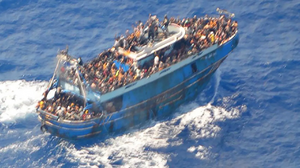
Date: June 14, 2023. Location: Ionian Sea, off the coast of Pylos, Messenia, Greece. Casualties: 80 deaths confirmed. Missing: As many as 500 presumed dead
This report intends to present the media coverage of Al Jazeera, The New York Times, Deutsche Welle and Dawn surrounding the 2023 Messenia Boat Tragedy, which resulted in the loss of nearly 500 undocumented immigrants in the Ionian Sea, off the coast of Pylos, Messenia, Greece. Through an examination of media cultures and systems in these four distinct news outlets from across different parts of the world like the
Global South, the Middle East, Europe and North America, the report seeks to explore how the issues of undocumented migration are portrayed in various regions and how these media platforms approach the subject of migration. Additionally, it aims to present the reporting of this tragic incident between June 14 until June 30, highlighting the different approaches employed by news organizations based on factors such as geographical proximity, human empathy, and relevance.
Background
On June 14, 2023, a fishing boat, called Adriana, overloaded with migrants fleeing economic hardships, war, and conflict from Pakistan, Syria, Palestine, Turkey, Egypt, and Afghanistan, capsized in the Ionian Sea, off the coast of Pylos, Messenia, Greece. With an estimated 750 individuals on board, the vessel suffered a catastrophic capsizing, leading to the presumed loss of around 500 lives[1]. The disaster unfolded around 1:40 a.m.[2] (EEST) when the Hellenic Coast Guard (HCG) received a distress call reporting Adriana's engine failure. HCG officers responded, attempting to aid the vessel. However, during their intervention, the Adriana made sharp turns that ultimately led to its capsizing, leaving the passengers adrift in the Ionian Sea. Survivors alleged that the HCG's efforts to tow the boat might have caused its overturning, resulting in the tragic sinking approximately 50 miles off the coast of Pylos, Messenia, in the Peloponnese. The location of the incident was within the deepest part of the Mediterranean Sea, in waters approximately 13,000 to 17,000 feet deep.

By June 18, it was confirmed that over 500 individuals[3] were presumed dead. Among the 104 survivors, there were no women and children. Reports revealed that smugglers had confined women and children below deck[4], potentially leaving up to 100 children on board at the time of the sinking. Leaked testimonies shared by survivors revealed that Pakistanis were allegedly forced below deck[5], while other nationalities were given preferential access to the top deck, resulting in significant disparities in their chances of survival during the capsize.
Involved Medium
The four reputable news outlets – The New York Times, Deutsche Welle, Al Jazeera, and Dawn, have been selected for their coverage of international news relying on primary sources. This diverse set includes outlets from the United States, Germany, Qatar, and Pakistan, ensuring a more comprehensive and representative perspective on their respective regions. These news organizations prioritize firsthand accounts by engaging their reporters in direct conversations with individuals involved in the reported incidents. They also refrain from solely relying on information from news agencies, such as AP or Reuters, thereby offering a more nuanced and reliable understanding of the events at hand.
The New York Times
The New York Times, also known as the Times or NYT, is a daily newspaper headquartered in New York City. The Times was established in 1851[6] as a penny paper that would avoid sensationalism and report the news in a restrained and objective fashion. In 2022, the average weekday print circulation of The New York Times was approximately 310,000 copies[7], and more than two million digital-only bundle[8] and multiproduct subscribers.
Deutsche Welle (DW)
Deutsche Welle (DW)[9] is Germany’s international broadcaster financed by the German federal tax budget. DW operates across various multimedia platforms, including television, radio, and online services. DW has a vast global reach, broadcasting in multiple languages, including English, German, Spanish, Arabic, and others. Its programs and news articles are translated into 32 languages. DW’s content centralizes around six focus topics: freedom and human rights, democracy and good governance, free trade and social justice, technology and innovation, health education, nutrition and environmental protection, and German and European culture.
Al Jazeera
Al Jazeera is an international news organization headquartered in Doha, Qatar. Found in 1996, it began as a satellite news channel in Arabic catering to the Middle Eastern audience. Over time, Al Jazeera expanded its reach and now broadcasts in multiple languages, with Al Jazeera English being its primary English-language channel. It also owns a social media branch called AJ+.
Dawn
Dawn newspaper, established in 1941 during the era of British India, remains a prominent English-language publication in Pakistan. It was launched by Pakistan’s founding father Muhammad Ali Jinnah, as a mouthpiece for the All-India Muslim League. Dawn, like most English-language newspapers in Pakistan, covers all four provinces[10] with relative equality.
Media Systems and Culture
The New York Times
The New York Times does not publicly acknowledge its political stance as in its ethical journalism section, the company emphasizes that, “The goal of the New York Times is to cover the news as impartially as possible.” [11]In an interview that questioned the coverage of the company’s news being too liberal and biased, the executive editor Dean Baquet said he “doesn’t believe that the coverage [on the paper] on most days has a liberal cast,” adding that the company’s goal is to be seen as “fair and honest to the world, not just a segment of it”[12]. However, in a research journal, the dataset reveals that in between 1946 and 1997, when the incumbent president is a Republican, the New York Times tends to place greater emphasis on issues where the Democratic party is seen as having greater competence, including civil rights, health care, labour, and social welfare. While on a media bias research website, the data shows that New York Times (Opinion) is a news media source with an AllSides Media Bias Rating™ of Left. The website noted that the editorial Board’s bias accounts for roughly 60 per cent of the rating.[13]
The New York Times has a World News [14]section that has segments for Africa, Americas, Asia, Australia, Canada, Europe, and the Middle East. According to a content analysis published in 2003, it shows that the number of international news items in the New York Times has decreased over the last 22 years. Roughly one in five items contained second-hand or borrowed news (material just disseminated by and attributed to another news organization), though trend analysis indicates increasing news borrowing[15].
Deutsche Welle (DW)
DW provides news coverage from German and European perspectives. DW adheres to principles of fairness, neutrality, and objectivity in its reporting. It claims itself as an unbiased German media organization[16] and goes with the tagline Made for Minds. DW aims to give people across the world the opportunity to form their opinions. DW’s media system draws its readers to assess issues of local and global significance and participate in social debates as active, informed, and knowledgeable citizens. However, since DW is a public broadcaster financed by the German federal tax budget, the potential for subtle political influence cannot be ignored.
DW’s stated mission is to present the German worldview to foreign audiences via several hundred television and cable networks in Western and Eastern Europe, in North and Latin America, as well as Asia. (Silcock, 2002). In a 2005 revision of its mission statement, DW explicitly positions the dialogue function as a main aim: “DW was commissioned to convey ‘German and other positions on important issues, chiefly from politics, the arts and economics" to people abroad "as well as to provide a forum in Europe and other continents aimed at promoting understanding and dialog between cultures and peoples.’ Promoting the German language is another part of the DW mission.” [17]
According to a research journal, [18] DW takes a pragmatic approach to their reporting. “It heavily enforces and supports the humanitarian side of the issue, but also sheds light on the issue that then becomes apparent.” DW has a multilingual and multicultural approach. This is reflected in its programming, which covers a wide range of topics from different cultural and regional perspectives.
Al Jazeera
Al Jazeera's political stance has been a topic of discussion and debate. It is funded by the Qatari government, leading some critics to assert that it reflects the political interests of Qatar's ruling elite. However, the network claims to operate with editorial independence and often provides coverage that differs from the state's official stance. Al Jazeera is currently actively re-evaluating its content and working on reshaping its public image, it remains a polarizing entity (Sahraoui, Zayani, 2004). Opinions about the network vary widely, from high praise to strong criticism. However, one consensus is clear: Al Jazeera represents a significant departure from the traditional norms of Arab media.
The network adopts a global approach, with bureaus around the world, allowing it to provide diverse perspectives. Moreover, Al Jazeera has embraced digital transformation with its strong online presence, including its AJ+ offshoot, which focuses on short-form, digital-first content. As a result, it bridges the gap between traditional and new media, appealing to a broad spectrum of audience across different platforms and regions.
Dawn
Dawn's media culture, as stated by its code of ethics[19], emphasizes fair, unbiased and accurate journalism. The publication is committed to providing a comprehensive view of events while also addressing social and political issues, especially in the context of migration, underscores the topic’s relevance in the national discourse.
It has a reputation[20] for upholding liberal and progressive values, emphasizing democratic norms, and advocating for freedom of the press. However, it is essential to note that while Dawn often maintains a critical stance towards the government, it does not espouse an overtly partisan political ideology[21]. The paper has been known to cover a wide range of opinions and has hosted diverse voices.
The publication has faced challenges and criticism due to its critical reporting on political and social issues. It has sometimes been subjected to censorship[22] and faced pressure from different governments[23], particularly when reporting on sensitive topics, including issues related to national security, civil-military relations, and governance.
One notable incident involves Dawn's coverage of a National Security meeting in 2016[24]. The newspaper reported details of a high-level meeting that discussed Pakistan's relationships with militant groups. This article generated significant controversy[25], leading to accusations of treason and displeasure from the military establishment. Subsequently, Cyril Almeida[26], the journalist who authored the article, was briefly placed on the Exit Control List (ECL)[27] and faced legal action. This incident highlighted the challenges faced by media outlets in Pakistan when reporting on matters related to national security and civil-military relations.
Coverage of Messenia Boat Tragedy
The New York Times
Overview of migration coverage:
The New York Times does not have a section dedicated for migration, as they report incidents in a timely manner. The media coverage on migration is spread out into different sections such as Business, New York, Opinion, U.S., and World.
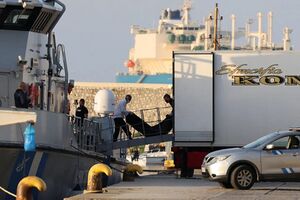
Coverage of Boat Tragedy:
The first article about the migrant boat titled “At Least 79 Die as Boat Carrying Migrants Sinks Near Greece” [28]was published on June 14, 2023, soon after the incident. The piece is written by Niki Kitsantonis and Cora Engelbrecht, and the Times noted that Niki Kitsantonis reported from Athens, and Cora Engelbrecht from London. The article highlighted three main points: the sinking was the deadliest off Greece since 2015, thousands die along these routes each year, and migration is a central issue in Greece’s election.
The second article came out the next day on June 15, 2023, titled “Greece Detains 9 on Charges Amid Search for Migrants After Crowded Ship Capsizes”[29]. The article noted that the authorities revised the death toll to 78 people but hundreds are missing, while nine survivors were detained on criminal charges. The Times used information that the survivors told the Greek official, such as some suggesting that there were 500 people aboard, while others believed there were 750 passengers.
The articles written on June 16[30], 19[31] and 27[32] are mostly about Greece’s migration policies, the country’s methods in handling the incident, and how the Greek authorities blame smugglers for the disaster. The articles have interviewed families of the migrant boat passengers to talk about their reason for boarding the overcrowded boat. They also looked into the cause of the Europe migration crisis and critics’ opinions on the matter.
Meanwhile, on June 19, 2023, another article titled “Pakistan Declares Day of Mourning for Migrant Ship Disaster Off Greece”[33] by Christina Goldbaum reported from London and Salman Masood from Islamabad, Pakistan. The article highlighted that “officials say more than 100 Pakistanis were among those killed when a fishing boat overloaded with migrants capsized in deep Mediterranean waters. The death toll of the disaster is expected to rise”. The article also noted that, “Pakistani authorities have arrested at least 15 people for their involvement in the trafficking of several migrants who drowned”. The article also said that Pakistan’s defense minister, Khawaja Muhammad Asif, “accused Greek authorities of not doing enough to rescue those aboard the ship”.
Deutsche Welle (DW)
Overview of migration coverage:
DW has a long-standing history of covering migration-related issues and has a separate section devoted to covering migration. DW’s migration page is further divided into three sections - news, reports and analysis, and in the spotlight.
In the early years of DW, migration[34]-related coverage focused primarily on geopolitical events such as the aftermath of World War II[35], the division of Germany, and the subsequent waves of migration within Europe. Eventually with globalization and changing migration patterns DW started providing in-depth analyses[36] of migration trends, the experiences of migrants, and the impact of migration on both the countries of origin and destination. DW calls back to refugees and an ‘open-door policy.’ The usage of terms like open-door policy paint more of a positive light, rather than a negative light (Akhtar, 2021).
Coverage of the Boat Tragedy:
DW’s first story came as a timely hard news taken from Reuters published under the migration section. The story goes with the title: Greece says 79 dead in migrant boat sinking.[37] Followed by: Greece: Migrant boat tragedy leaves hundreds missing.[38] In this article, DW covered how Greece and Pope Francis mourned amid differing accounts of shipwreck. For the initial days, DW attributed all its published news and information to external news agencies.
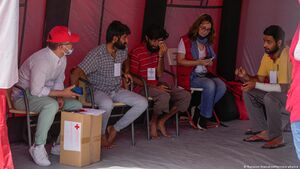
For the first week, DW’s coverage intended on providing the news to its readers. It acted as a tool for conveying news and information to its audience spread across the world. Eventually, DW started unraveling core issues of migration. DW did multiple stories in the following week emphasizing on UN’s comment[39], coast guards facing accusations[40], and rescuing measures. DW put forth a critical opinion of the tragedy through their Greece: Not an unexpected tragedy[41] story. With Pakistani citizens accounting for the largest number of victims, DW did an extensive ground report by talking with victims’ families[42] about why so many are choosing to risk their lives for an uncertain future in Europe. The headline read: Greece boat tragedy exposes Pakistan's migration problem.[43] DW published statistics on irregular Pakistani migration into Europe, how traffickers in Pakistan operate, and how the country cracked down on human trafficking.
DW’s coverage, rather than just being political, put out individual stories of survivors, thereby addressing a human-interest angle. DW did an exclusive interview[44] with a Pakistani survivor, Usman Sadique, where he talks about the trauma that follows him after the tragedy. DW has clips of Sadique being welcomed by his family. Sadique narrates his experience and can be seen tearing up during the interview. Furthermore, DW’s correspondent Max Zander reports on migrants seeking answers from the government [45]following one of the deadliest shipwrecks in Greece’s history.
Al Jazeera
Overview of migration coverage:
Al Jazeera is one of the leading news outlets providing comprehensive coverage of global events, including migration. Over the years, Al Jazeera has undertaken in-depth reportage on migration trends, refugee crises, and related human rights concerns in a very consistent manner. Through its “Migration” column, Al Jazeera’s coverage often extends beyond presenting facts, delving into the personal stories of migrants, their struggles, aspirations, and the challenges they face. The network's global presence, facilitated by correspondents stationed around the world, allows it to cover migration issues from various angles.
Coverage of the Boat Tragedy:
A tragic event unfolded near the coastal town of Pylos when a boat, packed with hundreds of refugees and migrants, capsized. Reports from Al Jazeera started by indicating that as many as 78 refugees and migrants died in the Ionian Sea on June 14th, 2023. Then they updated their numbers on June 16th by reporting on the 104 people rescued out of 750 people that were on the boat that capsized. The Greek coastguard became aware of the vessel's presence around 10 a.m. that Tuesday. However, earlier in the day, the boat had already signaled to be in distress, according to Alarm Phone, an NGO dedicated to assisting refugees in peril at sea. Throughout the following week, multiple attempts were made to follow up on the story. Al Jazeera kept on providing an hourly timeline of the events that occurred on June 14th, according to statements issued by Alarm Phone and Greek authorities.
In the aftermath of the tragedy, it was uncovered that a significant portion of the migrants hailed from Pakistan. This revelation led to swift action by Pakistani authorities, resulting in the arrest of ten individuals suspected of human trafficking. This incident drew significant attention from the highest echelons of Pakistan's government, with Prime Minister, Shehbaz Sharif, ordering an immediate and rigorous crackdown on agents involved in people smuggling.

Survivors who spoke to Al Jazeera provided diverse accounts of the unfolding events leading to the disaster. Some survivors pinpointed the coastguard's attempt to tow the trawler as the primary cause of the capsizing, while others believed that overloading the boat was the issue. The Greek coastguard, while admitting their presence at the scene, initially refuted claims of making physical contact with the trawler. However, subsequent revelations and testimonies hinted at a possible intervention, like an attempt to tow or stabilize the boat, by the Coast Guard.
Dawn
Overview of migration coverage:
While not having a specific segment dedicated to migration, the paper delves deeply into topics due to Pakistan's struggle with migration-related issues. For instance, the coverage of Afghan refugees facing deportation[46] in November 2023 and the exodus of Pakistanis from the country in 2022[47] were among the many subjects covered by the publication.
Coverage of the Boat Tragedy:
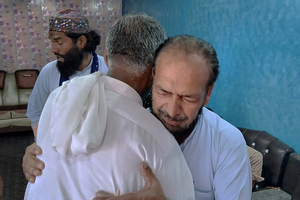
Dawn provided extensive reporting on the incident with at least 25 articles during the given time frame, emphasizing the plight of Pakistani victims aboard the boat that capsized in the Mediterranean Sea. In the initial reporting[48], Dawn offered a view of the disaster, encompassing the broader context, such as the circumstances leading to the boat's sinking[49], the number of casualties[50], and the responses from authorities[51]. However, as the coverage progressed, the focus shifted towards the Pakistani victims[52], delving deeper into their stories[53], experiences[54], and the challenges[55] they faced which led to them migrating.
Additionally, the follow-up reporting on the incident included updates on the investigations[56] and legal actions taken by relevant authorities, such as the arrests made by the Federal Investigation Agency[57]. Dawn's focus on how the victims, particularly the Pakistanis, were forced below-deck[58], putting them at a much greater risk of drowning, might have contributed to discussions about the vulnerabilities of migrants and the consequences of such situations.
The context of this coverage within Pakistan's severe economic downturn[59] amplified[60] discussions on the socio-economic factors contributing to migration, the challenges faced by migrants, and the ethical implications of how governments and societies handle such crises.
Public Discourse
The Messenia Migrant Boat Disaster led to various actions from the public. While a lot of discourse happened around social media, many decided to get on the ground and protest. People were empathetic and decided to collect funds and organize campaigns.
Social media activities
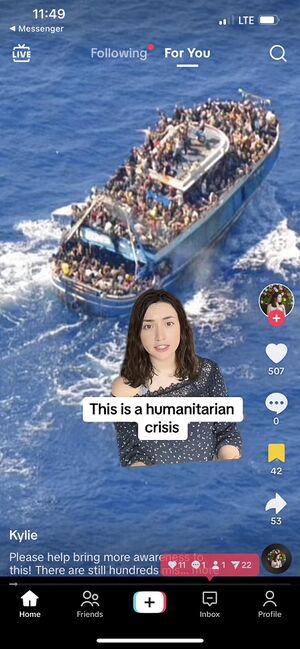
People’s opinion on TikTok can be found by putting keywords such as Greek migrant boat into the search bar. Comments on the videos of New York Times and Al Jazeera are mostly sympathetic toward the migrants. For example, they blamed Greek authorities[61] for this tragedy and were happy that the survivors reunited with their family[62]. However, for DW, the comment section distinctively split into two sides[63]. Some users congratulated the survivors on the reunion with their family. Others highlighted blamed the migrants and pointed out that they came illegally. Dawn, on the other hand, did not post any video on Tiktok, so there was no comment.
Besides commenting, people created their own TikTok videos expressing their views on this matter. For instance, one user was condemning the Greek authorities[64] and the other user emphasized that it is a humanitarian disaster[65].
Twitter is another platform where journalists [66]and experts[67] were joining the conversation. Hashtags, such as #OceanGate #Messenia #TitanicSubmarine #GreekCoastguard #Greekmigrantboat #Greeceboatdisaster #Greeceboatincident, were among those used in the tweets. Hashtags are still being used until nowadays.
Protests
Two days after the incident, Al Jazeera[68] published an article on the protest that erupted across Greece in response to Greek authorities’ handling of the migrant boat and the European Union’s migration policies.
However, Al Jazeera did not interview and include the voice of any protesters because it borrowed news and pictures from Reuters and other news agencies' reports.
The New York Times[69], on the other hand, did their own reporting. The news outlet included pictures, the translation of the demonstration signs, the protesters’ chanting, and the interview with one of the protesters.
For Deutsche Welle[70], the news outlet just used a picture of protestors from Reuters in its article. It did not mention anything about the protest in its content.

Lastly, Dawn did not cover any protest.
Search Help
Assistance for search help is also provided by Alarm Phone[71]. It is an activist project that aims to provide refugees in distress in the Mediterranean Sea an additional way to ask for rescue. It was founded by activists and civil society actors in Europe and Northern Africa. On June 14, 2023, Alarm Phone posted an article ‘Searching for people who went missing in Greece[72]’ on Twitter[73]. It detailed necessary documents, contact information, and resources to help people search for their missing friends and family members. The article is in six languages, including English, Arabic, Farsi, French, Turkish, and Kurdish.
Fundings
Funding is also garnered from the public to help alleviate the situation. The Hellenic Red Cross[74] is a non-governmental organization in Greece with the goal of supporting vulnerable people in the society, such as refugees, elders, and patients. Its volunteers[75] had been providing healthcare support, food, and other necessities to the survivors of this tragedy.
Moreover, Médecins Sans Frontieres/Doctors Without Borders (MSF)[76], an international medical humanitarian organization, offered both physical and mental health support to the survivors[77]. The organization also amplified the voice of refugees by including their testimonials in the article it published[77]. Furthermore, in this article and on its Instagram, [78]MSF called for the EU and Greece to take responsibility, launch a transparent investigation, and make changes to the policy to put saving lives first.
Comparison to Titan Submersible
Four days after the migrant shipwreck, Titan Submersible[79] went missing on June 18. The submersible was carrying five passengers, all of whom came from affluent backgrounds[80], to visit the Titanic wreckage. There are articles from news outlets that composed comparative analysis on the coverage on the two sea tragedies.
The New York Times[81] discussed the disparities between the attention given by the media and the audience to the Greek Migrant Boat and to the Titan Submersible. The news outlet mentioned that this tragedy sparked a discussion on social media about class and ethnicities.
Class and ethnicities, according to The New York Times, play a role in how a disaster is responded to. In this case, the Titan Submersible passengers were either white or wealthy, whereas people on the boat were migrants mostly from South Asia and the Middle East[81].
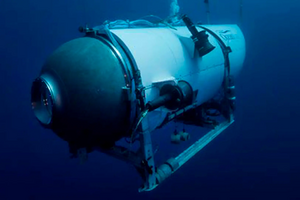
Many social media users were not concerned about the fate of the Titan Submersible[81]. They started to compare the two incidents and the phrase “eat the rich” was circulated online. The New York Times said that the reaction of people toward the submersible was partly a result of rising dissatisfaction with the economic inequality and the wealth that concentrated only among people at the top[81].
Dawn[82] published a letter that talked about the reaction of the public to the two tragedies. The writer made an observation that humans generally sympathized more with the tangible, personal, relatable stories, as opposed to a large-scale tragedy with faceless victims. Hence, the writer concluded that this is one of the reasons why the public reacted differently to the two tragedies.
Al Jazeera[83] published an opinion piece that deeply analyzed the coverage of the Greek migrant boat and Titan Submersible. Similarly, the writer attributed the disparity in coverages to geopolitical, class, race and caste lines. She also discussed how each group is portrayed in the media. On the one hand, the refugees are usually described in European media as economic migrants, gullible and foolhardy, and bringing the catastrophe to themselves. On the other hand, the five men on Titan Submersible were referred to as adventurers and explorers.
Nevertheless, there is not any article on DW that brought up the comparison made by the public between Titan Submersible and the Greek migrant boat.
Comparative Analysis
The media framing and coverage—The New York Times, Deutsche Welle, Al Jazeera, and Dawn—differ depending on the respective cultures and systems.
The New York Times places its focus more on how the incident affected the political landscape in Greece. The New York Times did its reporting by journalists either stationed or familiar with the situation. The contexts provide overview of the incident and delve into the cause of the situation. Most of the coverage uses first-hand information through interviewing victims, authorities, representatives and using official documents. However, they spend around three articles looking into Greece’s political situation and how the event impacts the upcoming election.
While for the initial days, DW intended to provide news and information to its readers. Eventually, DW started delving into the context and causes of the migrant boat tragedy. In addition to putting forth its critical opinion on the coast guards, DW reported on the personal narratives of the Pakistani survivors, as they accounted for the highest number of victims. DW's coverage touched upon all the underlying influences by examining the coast guard's role, interpreting the number of deceased, economic crises in Pakistan, and publishing personal narratives.
On the other hand, Al Jazeera and Dawn had more of an empathetic approach towards their reporting. For Al Jazeera, its coverage includes an in-depth examination of the Greek coast guard's role and the questions arising from their actions during the tragedy, a timeline of how the migrant boat tragedy unfolded, personal stories from victims' families, initial reports on the number of deceased and missing individuals, and survivors' accounts highlighting the presence and actions of the Greek coastguard at the time of the capsizing.
These articles collectively offer a comprehensive view of the event, blending factual reporting with personal narratives and survivor interviews, showcasing Al Jazeera's thorough approach to covering migration issues. Whilst for Dawn an analysis that extended beyond the immediate event and its aftermath. It delved into the broader context, particularly highlighting the economic crisis in Pakistan that compels individuals to resort to drastic measures for migration. This approach offered a more in-depth understanding of the underlying factors influencing such incidents.
The Messenia migrant boat disaster triggered several responses from the public, including social media activities, protests, funding, search help, and discussion about the disparity in media coverage and the audience reaction between the migrant boat and the Titan Submersible. The majority of the discourse sympathized with the migrants; the public was offering help, calling out Greek authorities, the EU, as well as the media outlets. The only exception was the comment section of DW, where some users were criticizing the migrants. Further, The New York Times and Al Jazeera were the two outlets that covered the public discourse the most. They mentioned the protest and the public conversation about the Titan Submersible in their articles. In contrast, Dawn only reported on the comparison between the two tragedies. Lastly, DW only used a picture of the protest, but its content did not include anything about the demonstration or the two sea tragedies.
References
- ↑ "Dozens of migrants dead, fears for hundreds missing in Greece shipwreck". France24.
- ↑ "At least 79 dead after overcrowded migrant vessel sinks off Greece; hundreds may be missing". Associated Press.
- ↑ "'We just want to know if he is alive or dead': migrants desperate for news of relatives in Greece shipwreck disaster". The Guardian.
- ↑ "At least 79 dead after overcrowded migrant vessel sinks off Greece; hundreds may be missing". Associated Press.
- ↑ "Greece boat tragedy: Pakistanis were forced below deck: report". Dawn.
- ↑ "Britannica: The New York Times".
- ↑ "Average paid and verified weekday circulation of The New York Times from 2000 to 2022".
- ↑ "The New York Times Company 2022 Annual Report" (PDF). The New York Times Company.
- ↑ "Made for minds".
- ↑ Shah, Hijab (December 2010). "The Inside Pages: An Analysis of the Pakistani Press The Tongue-tied Press of Pakistan: Comparing English and Urdu Newspapers" (PDF). South Asia Monitor. 148. line feed character in
|title=at position 53 (help) - ↑ "Ethical Journalism: A Handbook of Values and Practices for the News and Opinion Departments".
- ↑ "Why Readers See The Times as Liberal".
- ↑ "The New York Times (Opinion)".
- ↑ "The New York Times: World News".
- ↑ "International News and Borrowed News in the New York Times: An Update". Sage Journals.
- ↑ "DW: Code of Conduct in 32 languages".
- ↑ Richter, Carola (September 2008). "International Broadcasting and Intercultural Dialogue: Deutsche Welle in the Arab World" (PDF). Arab Media and Society. line feed character in
|title=at position 45 (help) - ↑ Akhtar, Mohammed (December 2021). "Media Representation of Mass Migration in Germany". Connecticut College.
- ↑ "Code of Ethics - Dawn". Dawn.
- ↑ Sethna, Rezeshta (2015). "Caught between five extremes: Reporting Pakistan" (PDF). Reuters Institute for the Study of Journalism.
- ↑ Ittefaq, Muhammad; Ejaz, Waqas; Fahmy, Shahira S; Sheikh, Ammar Malik (November 2021). "Converged journalism: practices and influences in Pakistan". Sage Journals. 181. doi:https://doi.org/10.1177/1329878X211017329 Check
|doi=value (help). - ↑ "Censorship central". Dawn. April 2023.
- ↑ Hanif, Mohammad (October 2018). "Censorship Under Military Dictators Was Bad. It May Be Worse in a Democracy". The New York Times.
- ↑ Almeida, Cyril (October 2016). "Exclusive: Act against militants or face international isolation, civilians tell military". Dawn.
- ↑ "Reaction to Dawn story". Dawn. October 2016.
- ↑ Hashim, Asad (April 2019). "Pakistan's Cyril Almeida named IPI's World Press Freedom Hero". Al Jazeera.
- ↑ "Pakistani journalist Cyril Almeida 'barred from leaving country'". BBC. October 2016.
- ↑ "At Least 79 Die as Boat Carrying Migrants Sinks Near Greece".
- ↑ "Greece Detains 9 on Charges Amid Search for Migrants After Crowded Ship Capsizes".
- ↑ "Hundreds Dead, 9 Arrested, and Many Questions in Migrant Wreck".
- ↑ "Greek Coast Guard Under Scrutiny for Response to Migrant Mass Drowning".
- ↑ "E.U. Border Agency Considers Pulling Out of Greece Over Migrant Abuses".
- ↑ "Pakistan Declares Day of Mourning for Migrant Ship Disaster Off Greece".
- ↑ "Migration".
- ↑ "World War II".
- ↑ "Migrants Spur Economic Growth in Germany".
- ↑ "Greece says 79 dead in migrant boat sinking".
- ↑ "Greece: Migrant boat tragedy leaves hundreds missing".
- ↑ "UN says migrant boat capsizing off Greece 'horrific tragedy'".
- ↑ "Greece migrant boat disaster: Was the coast guard to blame?".
- ↑ "Greece: Not an unexpected tragedy".
- ↑ "Greece migrant boat disaster: A wife left behind in Pakistan".
- ↑ "Greece boat tragedy exposes Pakistan's migration problem".
- ↑ "Pakistani survivor haunted by memory of sinking migrant boat".
- ↑ "Migrants seek answers after Greece boat disaster".
- ↑ Farooq, Umer; Shahid, Saleem; Khan, Iftikhar A. (November 2023). "Crackdown on 'illegal' migrants gets underway". Dawn.
- ↑ Mian, Bakhtawar (June 2022). "Number of Pakistanis going abroad for jobs rises 27.6pc". Dawn.
- ↑ "At least 79 drown, countless missing in migrant shipwreck off Greece". Dawn. June 2023.
- ↑ Irfan, Wara; Fazal, Hawwa (July 2023). "Why thousands of Pakistanis are dying to leave the country". Dawn.
- ↑ "At least 79 drown, countless missing in migrant shipwreck off Greece". Dawn. June 2023.
- ↑ Khan, Sanaullah; Naqash, Tariq (June 2018). "Authorities arrest 11 suspects allegedly involved in trafficking Greece shipwreck victims". Dawn.
- ↑ "Greece boat tragedy: Pakistanis were forced below deck: report". Dawn. June 2023.
- ↑ "Greece boat disaster: A Pakistani father's anguish over his missing son". Dawn. June 2023.
- ↑ Naqash, Tariq; Butt, Waseem Ashraf. "Country mourns 'hundreds' lost in boat tragedy". Dawn.
- ↑ "Pakistan's economic meltdown spurs more people to risk lives to reach Europe". Dawn. June 2023.
- ↑ Khan, Iftikhar A. (June 2023). "FIA team set up to track down human traffickers". Dawn.
- ↑ Guramani, Nadir; Ali, Imtiaz (June 2023). "FIA arrests suspect for alleged involvement in smuggling of Libya shipwreck victims". Dawn.
- ↑ "Greece boat tragedy: Pakistanis were forced below deck: report". Dawn. June 2023.
- ↑ "Pakistan's economic meltdown spurs more people to risk lives to reach Europe". Dawn. June 2023.
- ↑ Ali, Furkan (June 2023). "Drowning in despair: Racist laws, anti-migration policies to blame for deaths of thousands of refugees". Dawn.
- ↑ The New York Times. "At least 78 die as boat carrying migrants sinks near Greece". TikTok.
- ↑ Al Jazeera English. "Emotional reunion of Syrian brothers after Greece shipwreck". TikTok.
- ↑ Deutsche Welle. "Two Syrian brothers reunite after migrant boat capsized". TikTok.
- ↑ Sheabuttermother. "Sheabuttermother's answer to "girl what happened in Greece?!"". TikTok.
- ↑ crimewithkylie. "crimewithkylie's summarization of the Messenia Migrant Boat Disaster". TikTok.
- ↑ @fatimabsyed. "Welcome to Day 4 of the 🌎 caring way more about 5 rich people in a lost submarine looking for the Titanic vs. the second-deadliest refugee & migrant shipwreck on record that saw a boat carrying ~800 migrants — WHOSE NAMES WE STILL DO NOT KNOW — sink off the Greek coast". Twitter.
- ↑ @PippaN15. "I get why everyone is interested in the lost sub, I really do". Twitter.
- ↑ "Protests across Greece as hope to find shipwreck survivors fades". Al Jazeera. June 16, 2023.
- ↑ Horowitz & Kitsantonis, Jason & Niki (June 16, 2023). "Hundreds Dead, 9 Arrested, and Many Questions in Migrant Wreck". The New York Times.
- ↑ Bali & Kyranoudi, Kaki & Dimitra (June 16, 2023). "Greece: Not an unexpected tragedy". Deutsche Welle.
- ↑ "About". ALARMPHONE.
- ↑ "Searching for people who went missing in Greece". ALARMPHONE. August 06, 2022. Check date values in:
|date=(help) - ↑ @alarm_phone (June 14, 2023). "Alarm Phone Statement on the fatal shipwreck off #Greece". Twitter.
- ↑ "Hellenic Red Cross". Hellenic Red Cross.
- ↑ "Hellenic Red Cross volunteers support survivors of deadliest shipwreck off Greece this year". BritishRedCross. June 15, 2023.
- ↑ "Who we are". Médecins Sans Frontieres/Doctors Without Borders (MSF).
- ↑ 77.0 77.1 "EU and Greece must take accountability after deadly shipwreck". Médecins Sans Frontieres/Doctors Without Borders (MSF). June 29, 2023.
- ↑ doctorswithoutborders (July 5, 2023). "From one of the survivors: "When the boat capsized, I clung onto a metal railing for my life. I could see people being thrown around, being crushed against boat parts, and being slammed into the sea."". Instagram.
- ↑ "Titan sub timeline: When did it go missing and other key events". Al Jazeera. June 23, 2023.
- ↑ Salcedo, Javaid, McDaniel, lati, Pietsch, and Suliman, Andrea, Maham, Justine, Marisa, Bryan, and Adela (June 21, 2023). "Who were the five passengers inside the missing Titan submersible?". The Washington Post. Retrieved https://www.washingtonpost.com/nation/2023/06/21/missing-titanic-sub-passengers-stockton-rush-paul-henri-nargeolet/. Check date values in:
|access-date=(help)CS1 maint: multiple names: authors list (link) - ↑ 81.0 81.1 81.2 81.3 Pérez-Peña, Richard (June 23, 2023). "5 Deaths at Sea Gripped the World. Hundreds of Others Got a Shrug". The New York Times.
- ↑ Mahtani, Chandru (June 28, 2023). "It's just the way the human mind works". Dawn.
- ↑ Gopal, Priyamvada (June 21, 2023). "Titan and the trawler: Whose lives matter?". Al Jazeera.